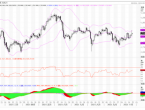Crude oil trading reminder: tight supply continues to provide upward momentum, the epidemic counters, and be wary of oil prices peaking and falling
During the Asian session on Monday (October 25), U.S. oil continued its rally, hitting a seven-year high in the morning to 84.28 US dollars per barrel. The market was worried that crude oil consumption grew faster than supply, and the shortage of natural gas and coal is triggering demand for petroleum products. And because OPEC+ oil-producing countries alliance only moderately supplies the market, the decline in US inventories has helped oil prices approach the 85 mark.
Focus on the US September Chicago Fed National Activity Index in the day
Bullish factors affecting oil prices
[Tight supply drives up oil prices]
U.S. President Biden said late on Thursday that, given OPEC and other oil-producing countries control production, Americans should expect the phenomenon of high gasoline prices to continue until next year. Inventories at the largest crude oil storage center in the United States have fallen to where they were the last time oil prices touched $100.
John Kilduff, a partner at Again Capital LLC, said that although oil prices have fluctuated significantly over the past two trading days, structural tightness in supply has always been the biggest driver of the market. No one in the market really expects OPEC+ to increase production significantly in the near future.
Oil prices surged last week to their highest level since 2014, as the market is concerned that consumption is growing faster than supply. The shortage of natural gas and coal is triggering additional demand for petroleum products. At the same time, OPEC and its allies once again failed to meet their production targets, exacerbating supply shortages as the world recovers from the coronavirus epidemic.
David Martin, Head of Commodity Strategy at BNP Paribas, said, "I think the market has correctly priced a very tight and intensified supply situation. We will use our inventory in this quarter and the next."
[Oil prices have skyrocketed by 60%, gasoline prices in many countries exceed 9 yuan per liter]
Statistics show that since the beginning of this year, international crude oil prices have soared by more than 60%. Recently, the U.S. supply chain has continued to be tight. Not only has the price of daily necessities increased sharply, but energy prices have also risen fiercely—especially the price of gasoline, which has reached the highest level in recent years. In California, the "premium gasoline" at gas stations in individual remote towns has risen to approximately US$8.5 per gallon, or approximately RMB 14.33 per liter. Some experts said that high energy prices may exacerbate the biggest inflationary panic in the United States in more than a decade. In addition, the price of gasoline in Britain, Japan, South Korea, India and other countries exceeded 9 yuan per liter.
The Saudi Energy Minister said on Saturday that more crude oil will not help alleviate the natural gas crisis, and that more crude oil will not help alleviate the natural gas crisis. Oil inventories may increase substantially next year.
[U.S. service industry recorded the fastest growth in three months in October]
Business activity in the US service industry recorded the largest growth in three months, and the manufacturing sector slowed down due to supply and labor shortages.
IHS Markit announced on Friday that the initial value of the IHS Markit Service Industry Purchasing Managers Index (PMI) rose to 58.2 from 54.9 a month ago. The manufacturing PMI fell to a seven-month low of 59.2. A reading above 50 indicates the expansion of the service industry.
Chris Williamson, chief business economist at IHS Markit, said that “service industry activity recovered in October and the number of new crown cases continued to decline, marking an encouraging and strong start to the economy in the fourth quarter”. But Williamson said that although manufacturers continue to report strong demand, factory production is still restricted due to record supply chain bottlenecks and labor shortages.
The comprehensive index of backlog orders this month rose to the highest level since October 2009, and the manufacturing delivery time was the longest since 2007.
The pressure on production capacity caused by the shortage of materials and the chaotic logistics and transportation is exacerbating inflation. IHS Markit's input cost index and price composite index both climbed to record highs. Service providers have been particularly successful in passing on high costs, with related indicators jumping 6 points, setting a record high. Recruitment activities in the service industry have further improved, and employment indicators have risen at the fastest rate since June.
Negative factors affecting oil prices
[Fed chairman hinted at concern about inflation, dragging stock market down]
The U.S. stock market fell last Friday after the Fed chairman hinted that he was worried about inflation. The S&P 500 index fell 0.1%, and the Nasdaq 100 index fell 0.9%. Fed Chairman Powell said that the Fed is paying close attention to price pressures and will make adjustments accordingly.
Powell said that the constraints and shortages of the global supply chain have led to high inflation rates, "it may last longer than previously expected, and it is likely to last longer until next year." However, he added that it is very likely that as these unfavorable factors ease, inflation will fall back to near the 2% target.
Investors are increasingly worried that rising cost pressures and bottlenecks in the global supply chain will prompt the Fed to raise interest rates faster than expected. However, a good start to the earnings season offset these concerns. The S&P 500 Index hit a record high on Thursday. Jim Bianco, founder and president of Bianco Research, said, “The market is increasingly worried that we are in a state of long-term inflation.”
[Iran attempts to increase the production of oil fields on the southwest border]
Mohsen Khojastehmehr, head of the Iranian National Petroleum Corporation, said it needs about $11 billion in investment to increase production from the oil fields on the southwest border shared with neighboring Iraq.
Khojastehmehr said that if the funding is obtained, the oil field's oil production will increase by more than 1 million barrels per day. Earlier this month, the Iranian Oil Minister said that he welcomes “any investor who is willing to provide funds for Iran’s energy projects and accept crude oil or condensate as payment.”
[Ukraine prepares to discount Russian gas transit fees by 50%]
Bloomberg quoted Ukrainian President Zelensky on the 23rd as saying that in order to "help European countries", Ukraine is preparing to discount the transit cost of Russian natural gas by 50%. At the same time, Moldova turned to Ukraine for help because it failed to reach an agreement with Russia on the issue of natural gas supply.
According to a report by RIA Novosti on the 23rd, Zelensky said in an interview with Bloomberg that Ukraine made a proposal to Gazprom (Gazprom) to provide a 50% discount on the transit fee for the amount of natural gas transported through Ukraine in excess of the contract. The current Russian-Ukrainian contract stipulates an annual natural gas transportation volume of 40 billion cubic meters. He said: "Ukraine is discussing the proposal with Berlin and Brussels and will soon take practical steps on this issue, because it is important for Europe as a whole. I want to emphasize: I am sure if we don’t do this now. Yes, Europe’s losses this winter will be huge. Only rapid and coordinated actions can prevent crises from happening."
[Russia has over 35,000 new confirmed cases]
According to Worldometer's real-time statistics, as of 6:30 on October 25th, GMT+8, there were a total of 244,398,334 confirmed cases of new coronary pneumonia worldwide, and a total of 4,963,289 deaths. There were 322,034 newly confirmed cases and 4,654 new deaths in a single day worldwide.
Data shows that the United Kingdom, Russia, Turkey, the United States, and Ukraine are the five countries with the largest number of new confirmed cases. Russia, India, Ukraine, Romania, and Mexico are the five countries with the highest number of new deaths.
According to the latest data released on the official website of the Russian new crown virus epidemic prevention on the 24th, Russia has 35,660 new confirmed cases of new crown pneumonia, a total of 8,241,643 confirmed cases, 1072 new cases of new crown pneumonia, and a total of 230,600 deaths.
In general, under the energy crisis, supply shortages and increased demand are the main driving forces for the increase in oil prices. The 85 mark of oil prices is close at hand. However, they are cautious about the rise of new cases in Russia and some Asian countries. Limit the increase in oil prices in the short term.
At 8:15 GMT+8, US crude oil is now quoted at US$84.07/barrel.











